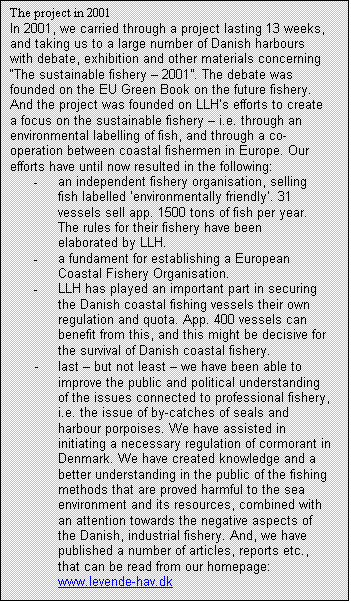|
The
Danish Society for a Living Sea (Landsforeningen Levende Hav,
LLH) needs support for a project in the Baltic Sea in 2002.
This is why we distribute this short description: to receive a
preliminary evaluation of our possibilities. The description will
be distributed to institutions in Denmark and in EU.
The Danish Society for a Living Sea (LLH)
LLH is a
non-profit and non-political, environmental organisation. Our
purpose is to work for an improvement of the sea environment and
the restoration of the resources of the sea. We implement projects
on the sea and in the harbours, with participation of fishermen
and consumers. Our method is to have direct, public contact in and
around a fishing vessel. We organise a variety of activities on
the quay: i.e. exhibitions, meetings, fish cooking. Out projects
are supported by the Danish state, EU and by private funds.

Our
intention with the sailing activities is to create a better
national and international understanding of the sea environment
and the environmentally friendly fishery. We invite people to
experience the sea – both under and above it. We work to teach
school classes and other groups about the sea environment on these
sailings. We make contacts between fishermen and consumers and
between European fishermen. We arrange conference with
participation of fishermen, consumers and experts. We show
exhibitions, films, slides and we can serve small tastes of fish.
When
involved in these activities, we communicate our purpose on our
home page, on the inter net and through the public media. Thus, we
hope to reach as many people as possible.
Since
1995, LLH has concentrated on the professional fishery. Now, a
solid basis has been created, leaving the environmentally friendly
fishery a chance to survive. Thanks to the EU Green Book and the
improved attention on fishery in Denmark. Thus, we plan to focus
on the pollution with chemical and organic substances. And we plan
to start in the Baltic Sea in 2002.
The Baltic Sea, 2002
LLH’s
rebuild fishing vessel, M/S Anton, and a number of LLH’s members
know the Baltic Sea thoroughly. A number of us have been fishing
in the Baltic Sea, and in 1002 and 1993 we have conducted large
environmental projects there.
In 1992
it was “Baltic Sea – Common Sea = Common Future” and in 1993
it was “Green Partners”. Thus, we have experience and a number
of contacts around the Baltic. In 1992, we reached as far as the
bottom of the Gulf of Bothnia. We set up our exhibition and held
meetings in Sct. Petersborg,
Klaipeda, Venespil, Pürnu, Åland, Gdansk etc. And all the way, authorities, fishermen, environmental organisations and
schools assisted us in our efforts.
Now
there still exists a need to create a larger public and political
interest for the Baltic Sea, concerning subjects such as: dioxin
and other toxics, i.e. TBT from the ship paint; oil releases from
ships; atomic transport through the Baltic etc. The organic
substances will tend to grow as a problem for the Baltic Sea, as
the agriculture of Eastern Europe transforms into industrial
agriculture. Within the fishery, we expect to meet problems with
seals, porpoises and drifting nets. And the biggest problem will
probably be the content of dioxin in the fat fish. Maybe we will
see a selling prohibition for salmon, herring, brisling and eel
from the Baltic Sea in the near future? Such a prohibition will be
a disaster for the professional fishery and the attached
industries in the Baltic Sea region.
The plan, 2002
We enter
the Baltic Sea in May 2002, and stay in the region until October.
Thus, we will be available for the groups and organisations
interested in the subject. It might be a local environmental
problem or a problem within the fishery. We will be there with the
perfect scene and facilities for further investigations and for
debate.
During
the winter 2001/2002, and the early spring we will:
-
contact
Danish and international organisations who will be interested in
participating in the project in 2002.
-
develop
an exhibition and other materials on the issue.
-
draw a
plan of where we will be – and when.
-
identify
the necessary crew for the vessel.
This
description is our first, and preliminary project outline for
2002. We will be present in the Baltic under all circumstances
with our vessel and equipment. The project will be implemented
along the lines described – dependent on the money we receive.
PLEASE,
contact Project Manager Kurt Bertelsen Christensen. Mail lev-hav@post4.tele.dk
phone 0045 97895590 or
Living
Sea office , Kattegatvej
3, DK-8500
Grenaa, Phone
0045 87580755
|